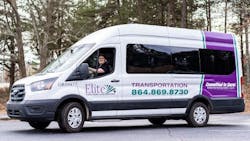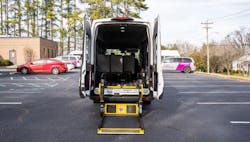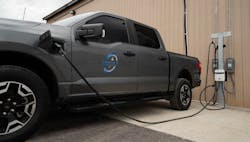Two fleets discuss the pains of EVs and their benefits—both expected and unexpected
There have been good and bad experiences throughout the electrification journeys of Elite Home Care, which has converted nearly its entire gas-powered fleet to electric vehicles, and Grade A Construction, which has converted 11 of its light-duty pickups into Ford Lightnings.
The bad includes pushback from employees and government policies. The good includes the expected fuel savings and ease of maintenance along with some unexpected perks.
EV transition pain points
This is the second part of a two-part series about the electrification journey of Elite Home Care and Grade A Construction. Read part one here.
Grade A Construction
While Jessica Cox, Grade A's VP of corporate services, said Grade A’s employees quickly adapted to the Ford Lightning electric pickups, their initial sentiments weren’t as positive. Cox said she’d heard from some of the employees that because Grade A is a construction company, it should stick to ICE vehicles. Then there were other complaints.
“Some of our grumblings were with chargers, especially: ‘I don’t want to charge at my home,’” Cox said. “The other one was: ... ‘I drive more than 300 miles a day.’ But we could go back ... and see from their [telematics] histories what they were driving per day.”
Grade A worked with its employees to help them get on board with the transition by simply saying, “Let’s try it, and if it doesn’t work, we’ll figure something out,” Cox said.
“They all love them now,” Cox told FleetOwner, mentioning the praise she hears from drivers about the extra storage space, one-pedal driving, the technology, and especially the decreased maintenance compared to a gas- or diesel-powered vehicle.
Today, Grade A’s biggest challenge with EVs is what happens after an accident.
“We have wrecked a couple of these EVs, and getting parts for them is a challenge,” Cox said. “We’d have trucks sitting at the shops ... waiting for parts. Parts are sometimes just a general overall issue, especially since COVID, but with the EVs, especially, finding parts and getting them repaired was definitely a roadblock for us.”
See also: Ford Pro offers EV suitability insights, charging incentive and announces mobile service growth
Elite Home Care
Chris Russo, Elite Home Care co-founder, said the main pushback he received from his drivers regarding a potential switch to EVs was mostly due to range anxiety. Similarly to Grade A, Elite Home Care overcame this hurdle simply by trying it out.
“It just took some time for [drivers] to get used to the platform and to get comfortable with it,” Russo said. The drivers know their own driving habits, and now they know to start thinking ahead if they see they're getting low on charge, he said.
Before drivers became accustomed to the platform, however, there was an instance when an Elite Home Care E-Transit ran out of charge, leaving a van full of passengers and a driver in need of rescue.
In this particular instance, dispatch simply sent another van to pick up the passengers, and they towed the depleted van back to base to charge up. Russo said it was more of a learning experience, as they used the circumstance to analyze what went wrong and what the driver could have done differently to avoid the problem. He also acknowledged that the team had encountered similar situations with ICE vehicles during instances when they ran out of gas.
See also: Fleet Advantage program designed to offer ‘easy’ EV path
However, Russo said that while running out of charge is similar to running out of gas, it’s the fact that his drivers can’t simply stop by a gas station and refuel that has required Elite Home Care to rely on its route planning and efficiency optimization.
“You can't just say, ‘I'll go get gas. I'll figure it on the road,’” Russo said. “And that's not the business we wanted to be. We wanted to be one that's purposeful, that plans out what we're doing.”
Another factor that Russo considers with EVs that he didn’t with ICE vehicles is government policy, which changes “it feels like every six months,” he said. Elite Home Care relies on government incentives to electrify its fleet, and navigating revolving policies has been a pain point.
“Although I care about the environment, we didn't get into [electrification] for environmental reasons,” Russo said. “We did it as a business for business reasons, so those government incentives do help.”
In the beginning, utility companies weren’t much involved with Elite Home Care’s electrification process because each facility’s electrical output provided the electricity necessary to charge the EVs overnight with Level 2 chargers. But business is growing, and Russo said Elite Home Care is installing one fast charger at each of its locations, which requires utility involvement.
When "dealing with energy companies, they all operate differently in how they want to support or not support this transition,” Russo said, explaining that although Elite Home Care operates in one state, it's 15 different locations aren't all served by the same utility company. "So those are different conversations with each [utility].”
Benefits of an EV fleet
Both Grade A Construction and Elite Home Care decided to implement EVs in their fleets because of the high cost of fuel. They’ve both realized a fuel savings benefit since then; Russo said a big chunk of Elite Home Care’s savings has been from fuel alone.
Yet, they both have found benefits in other areas as well.
Elite Home Care
Catalytic converter theft was a big problem at multiple Elite Home Care locations—so much so, that Russo employed large surveillance towers for its lots that housed ICE vans.
“We had to keep [surveillance towers] in our lots because it's like a buffet for someone that wants to steal a catalytic converter where all these big vans are sitting in a row,” Russo said.
When this happened, Elite Home Care would feel a strain on its operations. In the home care industry, people need to be picked up to make their appointments. “There’s no calling out or saying there’s a problem with our vehicle. You have to figure something out,” Russo said.
Electric vehicles solve this problem. His contract with the surveillance company is about to expire, and Russo said that’s one thing he’s excited to stop paying for.
Russo has also noticed that electric vehicles help attract drivers.
“I can't tell you how many times our drivers are stopped by other drivers to say, ‘What is that you're driving? Can I see that? That's really cool that that business is investing in their drivers,’ because that's their office all day,” Russo said. “That's where they're sitting. I think from attracting drivers and also keeping them here, [EVs have] been beneficial to us. We've heard quite a bit that [drivers] appreciate the investment in them.”
EVs make a more positive experience for Elite Home Care customers, too.
“In our particular business, I'm not hauling plumbing equipment,” Russo said. “I have people in there. For them, they like that it's quiet. They like that there's no exhaust that they're smelling, and that makes a difference for the passengers.”
Then, there’s the maintenance aspect, which Russo says makes up the other large chunk of Elite Home Care’s savings since implementing EVs. Preventive maintenance and “doing the small” things keep ICE vehicles running smoothly, yet if those small things aren’t being done on schedule, they can quickly become a big expense.
“We don't have the same amount of oversight that we had to have before,” Russo explained. “You don't have the risk of someone putting transmission fluid where they should be putting oil, right? Or you don't have somebody that drives when there may be an engine noise or an engine light and they keep driving ... and you end up with a blown transmission.”
See also: Top 10 FleetOwner Emissions & Efficiency stories of 2024
Grade A Construction
Grade A drivers have also appreciated the EVs and their ease of maintenance. No longer are drivers waiting for their trucks at the dealership forever, Cox said. Instead, they’re on the road.
Overall, running the Ford Lightnings versus the F-150s they were running before is “just easy,” Cox said.
“We expected [the EVs] to be something challenging or something we wouldn't be able to keep, but they're easy to manage. They're easy to drive,” she said.
About the Author
Jade Brasher
Senior Editor Jade Brasher has covered vocational trucking and fleets since 2018. A graduate of The University of Alabama with a degree in journalism, Jade enjoys telling stories about the people behind the wheel and the intricate processes of the ever-evolving trucking industry.



